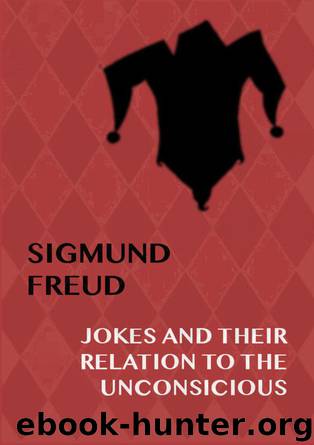Jokes And Their Relation To The Unconscious by Freud Sigmund

Author:Freud, Sigmund [Freud, Sigmund]
Language: eng
Format: epub, mobi
Published: 2013-04-12T23:00:00+00:00
V
THE MOTIVES OF JOKES - JOKES AS A SOCIAL PROCESS
It might seem superfluous to talk about the motives of jokes, since the aim of getting pleasure must be recognized as a sufficient motive for the joke-work. But on the one hand the possibility cannot be excluded of other motives as well having a share in the production of jokes, and on the other hand, bearing in mind some familiar experiences, we must raise the general question of the subjective determinants of jokes.
Two facts in particular make this necessary. Although the joke-work is an excellent method of getting pleasure out of psychical processes, it is nevertheless evident that not everyone is equally capable of making use of that method, the joke-work is not at everyone’s command, and altogether only a few people have a
plentiful amount of it; and these are distinguished by being spoken of as having ‘wit’ [Witz]. ‘Wit’ appears in this connection as a special capacity - rather in the class of the old mental ‘faculties’; and it seems to emerge fairly independently of the others, such as intelligence, imagination, memory, etc. We must therefore presume the presence in these ‘witty’ people of special inherited dispositions or psychical determinants which permit or favour the joke-work.
I fear that we shall not get very far in exploring this question. We can only succeed here and there in advancing from an understanding of a particular joke to a knowledge of the subjective determinants in the mind of the person who made it. It is a remarkable coincidence that precisely the example of the joke on which we began our investigations of the technique of jokes also gives us a glimpse into the subjective determinants of jokes. I refer to Heine’s joke, which has also been considered by Heymans and Lipps:
‘. . . I sat beside Salomon Rothschild and he treated me quite as his equal - quite famillionairely.’ (’B’der von Lucca.’)
Heine puts this remark into the mouth of a comic character, Hirsch-Hyacinth, a Hamburg lottery-agent, extractor of corns and professional valuer, the valet of the aristocratic Baron Gristoforo Gumpelino (formerly Gumpel). The poet evidently takes the greatest satisfaction in this creation of his, for he makes Hirsch-Hyacinth into a great talker and gives him the most amusing and plain-spoken speeches, and even lets him display the practical philosophy of a Sancho Panza. It is a pity that Heine, who seems to have had no taste for dramatic construction, dropped this delightful character so soon. There are not a few passages in which the poet himself seems to be speaking, under a thing disguise, through the mouth of Hirsch-Hyacinth, and it soon becomes a certainty that this character is only a self- parody. Hirsch explains his reasons for having given up his former name and why he now calls himself ‘Hyacinth’. He goes on: ‘There’s the further advantage that I already have an "H" on my signet, so that I don’t need to have a new one cut.’ But Heine himself effected the same economy when, at his baptism, he changed his first name from ‘Harry’ to ‘Heinrich’.
Download
Jokes And Their Relation To The Unconscious by Freud Sigmund.mobi
This site does not store any files on its server. We only index and link to content provided by other sites. Please contact the content providers to delete copyright contents if any and email us, we'll remove relevant links or contents immediately.
| Behaviorism | Cognitive Behavioral Therapy |
| Existential | Gestalt |
| Humanistic | Jungian |
| Psychoanalysis | Transpersonal |
The Art of Thinking Clearly by Rolf Dobelli(8845)
The 5 Love Languages: The Secret to Love That Lasts by Gary Chapman(8499)
Mindhunter: Inside the FBI's Elite Serial Crime Unit by John E. Douglas & Mark Olshaker(7835)
Becoming Supernatural by Dr. Joe Dispenza(7107)
The Road Less Traveled by M. Scott Peck(6636)
Nudge - Improving Decisions about Health, Wealth, and Happiness by Thaler Sunstein(6634)
Enlightenment Now: The Case for Reason, Science, Humanism, and Progress by Steven Pinker(6407)
Win Bigly by Scott Adams(6313)
Mastermind: How to Think Like Sherlock Holmes by Maria Konnikova(6236)
The Way of Zen by Alan W. Watts(5800)
Factfulness: Ten Reasons We're Wrong About the World – and Why Things Are Better Than You Think by Hans Rosling(4022)
The State of Affairs by Esther Perel(3932)
Gerald's Game by Stephen King(3919)
Man's Search for Meaning by Viktor Frankl(3635)
The Confidence Code by Katty Kay(3567)
Thinking in Bets by Annie Duke(3533)
The Worm at the Core by Sheldon Solomon(2918)
Enlightenment Now by Steven Pinker(2917)
Liar's Poker by Michael Lewis(2812)
